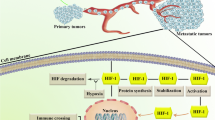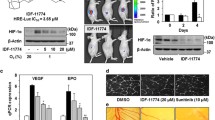Abstract
Gastric cancer is a malignancy and is the fourth most common cause of cancer globally. An oxygen-deficient microenvironment is a common state of gastric cancer, associated with tumor invasion and metastasis. Under hypoxic conditions, cancer cells start their own adaptive pathways to have a facilitated oxygen and energy supply for survival. In this condition, hypoxia-inducible factors (HIF) such as HIF-1α have a vital role particularly in cellular response to hypoxia and stimulate the major hallmark processes of tumor development, for example, angiogenesis, glucose transport, and metabolism by activating the transcriptional factors of various targeted gene involved in tumor development. Curcumin, a major phytochemical extracted from roots of Curcuma longa, inhibits proliferation of many types of solid cancer cells. Earlier, curcumin shows strong therapeutic potential against gastric cancer cell lines by downregulating the levels of the oncogene c-Myc expression and thereby hindering the expression of the targeted gene. Curcumin also exhibits antitumor effects under hypoxic conditions by significantly decreasing levels of hypoxia-induced HIF-1α protein, in cancer cells. Furthermore, curcumin eliminates cell proliferation, migration, and invasiveness generated by a hypoxic microenvironment and associated with HIF-1α accumulation.
The original version of this chapter was revised. The book was inadvertently published without Abstracts and Keywords, which are now included in all the chapters. An erratum to this chapter can be found at https://doi.org/10.1007/978-981-10-6728-0_39
Access this chapter
Tax calculation will be finalised at checkout
Purchases are for personal use only
Similar content being viewed by others
References
Abreu MT, Peek RM Jr (2014) Gastrointestinal malignancy and the microbiome. Gastroenterology 146:1534–1546
Aggarwal BB, Kumar A, Bharti AC (2003) Anticancer potential of curcumin: preclinical and clinical studies. Anticancer Res 23:363–398
Amanda MG, Robert AO (2008) Curcumin and resveratrol inhibit nuclear factor-kappaB-mediated cytokine expression in adipocytes. Nutr Metab 12:1–13
Anand P, Thomas SG, Kunnumakkara AB, Sundaram C, Harikumar KB, Sung B, Tharakan ST, Misra K, Priyadarsini IK, Rajasekharan KN, Aggarwal BB (2008a) Biological activities of curcumin and its analogues (Congeners) made by man and Mother Nature. Biochem Phramacol 76(11):1590–1611
Anand P, Thomas SG, Kunnumakkara AB, Sundaram C, Harikumar KB, Sung B, Tharakan ST, Misra K, Priyadarsini KI, Rajasekharan KN, Aggarwal BB (2008b) Biological activities of curcumin and its analogues (Congeners) made by man and Mother Nature. Biochem Pharmacol 76:1590–1611
Anto RJ, Mukhopadhyay A, Denning K, Aggarwal BB (2002) Curcumin (diferuloylmethane) induces apoptosis through activation of caspase-8, BID cleavage and cytochrome c release: its suppression by ectopic expression of bcl-2 and bcl-xl. Carcinogenesis 23:143–150
Arceci RJ (1996) Tumor cell survival and resistance to therapy. Curr Opin Hematol 3:279–287
Chen HW, Lee JY, Huang JY, Wang CC, Chen WJ, Su SF, Huang CW, Ho CC, Chen JJ, Tsai MF, Yu SL, Yang PC (2008) Curcumin inhibits lung cancer cell invasion and metastasis through the tumor suppressor HLJ1. Cancer Res 18:7428–7438
Ema M, Taya S, Yokotani N, Sogawa K, Matsuda Y, Fujii-Kuriyama Y (1997) A novel bHLH-PAS factor with close sequence similarity to hypoxia-inducible factor 1α regulates the VEGF expression and is potentially involved in lung and vascular development. Proc Natl AcadSci USA 94:4273–4278
Ferlay J, Soerjomatara I, Dikshit R, Eser S, Mathers C, Rebelo M et al (2015) Cancer incidence and mortality worldwide: sources, methods and major patterns in GLOBOCAN. Int J Cancer 136(5):E359–E386
Giles RH, van Es JH, Clevers H (2003) Caught up in a Wnt storm: Wnt signaling in cancer. Biochim Biophys Acta 1653(1):1–24
Han SS, Chung ST, Robertson DA, Ranjan D, Bondada S (1999) Curcumin causes the growth arrest and apoptosis of B cell lymphoma by downregulation of egr-1, c-myc, bcl-XL, NF- kappa B, and p53. Clin Immunol 93(2):152–161
Kang Y, Hu W, Bai E, Zheng H, Liu Z, Wu J, ** R, Zhao C, Liang G (2016) Curcumin sensitizes human gastric cancer cells to 5-fluorouracil through inhibition of the NFκB survival-signaling pathway. Onco Targets and Terapy 9:7373–7384
Karimi P, Islami F, Anandasabapathy S, Freedman ND, Kamangar F (2014) Gastric cancer: descriptive epidemiology, risk factors, screening, and prevention. Cancer Epidemiol Biomark Prev 23:700–713
Kim DC, Park KR, Jeong YJ et al (2016) Resistance to the c-Met inhibitor KRC-108 induces the epithelial transition of gastric cancer cells. Oncol Lett 11(2):991–997
Kolev TM, Velcheva EA, Stamboliyska BA, Spiteller M (2005) DFT and experimental studies of the structure and vibrational spectra of curcumin. Int J Quantum Chem 102:1069–1079
Krishnamachary B, Berg-Dixon S, Kelly B, Agani F, Feldser D, Ferreira G, Iyer N, LaRusch J, Pak B, Taghavi P, Semenza GL (2003) Regulation of colon carcinoma cell invasion by hypoxia-inducible factor 1. Cancer Res 63:1138–1143
Liu X, Sun K, Song A, Zhang X, Zhang X, He X (2014) Curcumin inhibits proliferation of gastric cancer cells by impairing ATP-sensitive potassium channel opening. World J Surg Oncol 12:389
Lu X, Kang Y (2010) Hypoxia and hypoxia-inducible factors (HIFs): master regulators of metastasis. Clin Cancer Res 16:5928–5935
Majmundar AJ, Wong WJ, Simon MC (2010) Hypoxia-inducible factors and the response to hypoxic stress. Mol Cell 40:294–309
Mukhopadhyay A, Banerjee S, Stafford LJ, **a C, Liu M, Aggarwal BB (2002) Curcumin-induced suppression of cell proliferation correlates with down-regulation of cyclin D1 expression and CDK4-mediated retinoblastoma protein phosphorylation. Oncogene 21(57):8852–8861
Prasad NS, Sarasija S (1997) Spectrophotometric estimation of curcumin. Indian Drugs 34:227–228
Rajalingam K, Schreck R, Rapp UR, Albert S (2007) Ras oncogenes and their downstream targets. Biochimica et Biophysica Acta 1773(8):1177–1195
Ravi R, Mookerjee B, Bhujwalla ZM, Sutter CH, Artemov D, Zeng Q, Dillehay LE, Madan A, Semenza GL, Bedi A (2000) Regulation of tumor angiogenesis by p53-induced degradation of hypoxia-inducible factor 1alpha. Genes Dev 14:34–44
Rohwer N, Cramer T (2010) HIFs as central regulators of gastric cancer pathogenesis. Cancer Biol Ther 10:383–385
Salem M, Rohani S, Gillies ER (2014) Curcumin, a promising anti-cancer therapeutic: a review of its chemical properties, bioactivity and approaches to cancer cell delivery. RSC Adv 108:15–29
Shishodia S, Amin HM, Lai R, Aggarwal BB (2005) Curcumin (diferuloylmethane) inhibits constitutive NF-kappaB activation, induces G1/S arrest, suppresses proliferation, and induces apoptosis in mantle cell lymphoma. Biochem Pharmacol 70(5):700–713
Simon A, Allais DP, Duroux JL, Basly JP, Durand-Fontanier S, Delage C (1998) Inhibitory effect of curcuminoids on MCF-7 cell proliferation and structure-activity relationships. Cancer Lett 129(1):111–116
Singh M, Singh N (2009) Molecular mechanism of curcumin induced cytotoxicity in human cervical carcinoma cells. Mol Cell Biochem 325:107–119
Tang XQ, Bi H, Feng JQ, Cao JG (2005) Effect of curcumin on multidrug resistance in resistant human gastric carcinoma cell line SGC7901/VCR. Acta Pharmacol Sin 26:1009–1016
Wang GL, Jiang BH, Rue EA, Semenza GL (1995) Hypoxia-inducible factor 1 is a basic-helix-loop-helix-PAS heterodimer regulated by cellular O2 tension. Proc Natl Acad Sci USA 92:5510–5514
Wang Y, Li Z, Zhang H, ** H, Sun L et al (2010) HIF-1α and HIF-2α correlate with migration and invasion in gastric cancer. Cancer Biol Ther 10(4):376–382
Xu MX, Zhao L, Deng C et al (2013) Curcumin suppresses proliferation and induces apoptosis of human hepatocellular carcinoma cells via the wnt signaling pathway. Int J Oncol 43:1951–1959
Zheng R, Deng Q, Liu Y, Zhao P (2017) Curcumin inhibits gastric carcinoma cell growth and induces apoptosis by suppressing the Wnt/β - catenin signaling pathway. Med Sci Monit: Int Med J Exp Clin Res 23:163–171
Author information
Authors and Affiliations
Corresponding author
Editor information
Editors and Affiliations
Rights and permissions
Copyright information
© 2017 Springer Nature Singapore Pte Ltd
About this chapter
Cite this chapter
Barik, T.K., Swain, S.N. (2017). Curcumin: Its Role in Regulation of HIF-1α in Gastric Cancer. In: Nagaraju, G., Bramhachari, P. (eds) Role of Transcription Factors in Gastrointestinal Malignancies. Springer, Singapore. https://doi.org/10.1007/978-981-10-6728-0_14
Download citation
DOI: https://doi.org/10.1007/978-981-10-6728-0_14
Published:
Publisher Name: Springer, Singapore
Print ISBN: 978-981-10-6727-3
Online ISBN: 978-981-10-6728-0
eBook Packages: Biomedical and Life SciencesBiomedical and Life Sciences (R0)




